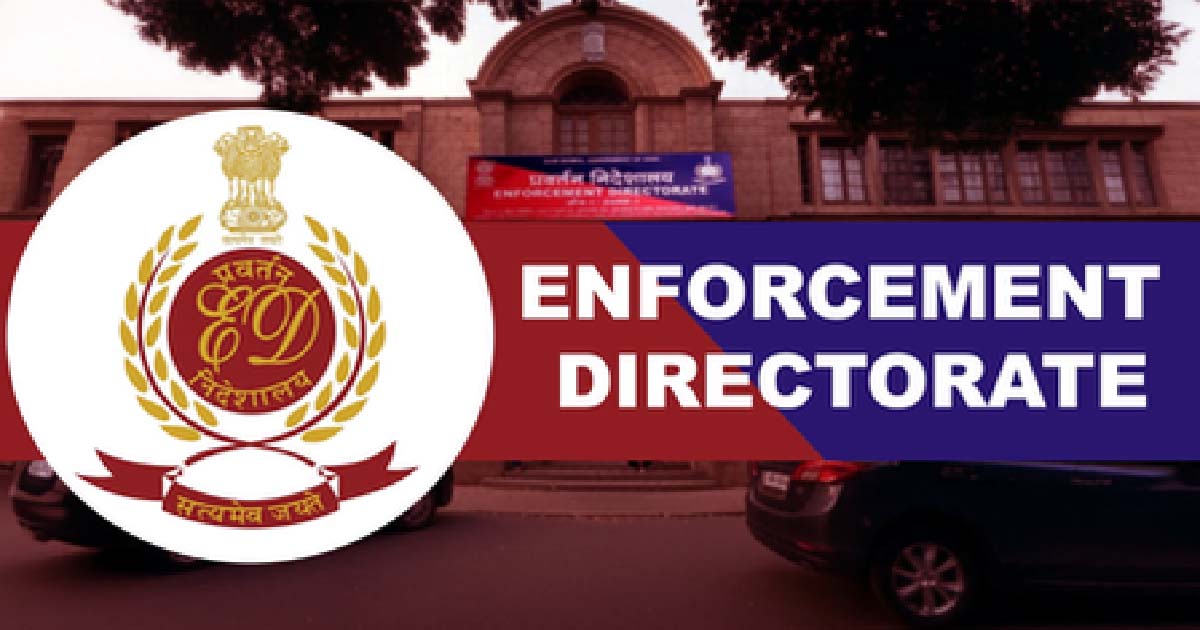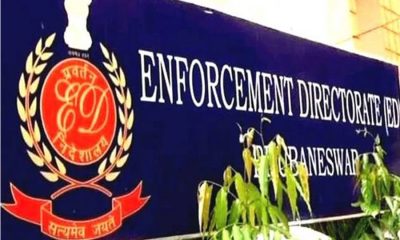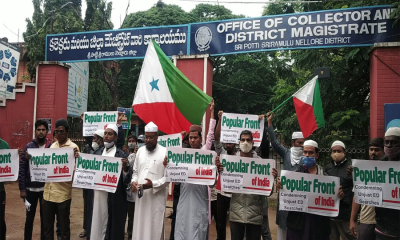Crime
2 arrested in Navjeevan Credit Co-operative Society scam case
The Enforcement Directorate (ED) on Sunday said it has arrested two persons in connection with the Navjeevan Credit Co-operative Society scam case.
According to officials, Jai Narayan Sharma and Nizamudin were arrested on the basis of the role played by them in money laundering.
Officials said they were arrested to unearth the true facts about generation, acquisition, layering and integration of proceeds of crime and for corroboration of other evidence in the aforementioned case.
According to the probe agency, a day ago (Saturday) it conducted searches at six premises of Sterling Urban Co-operative Bank Ltd, Ashapura Agro Industries, Western Energetics Private Limited, residential premises of Jai Narayan Sharma Chairman Sterling Urban Co-operative Bank Ltd, Rawat Singh and Preeti Swami in Rajasthan and Gujarat under the provisions of the Prevention of Money Laundering Act.
The investigation was initiated on the basis of an FIR and chargesheet filed by the Special Operation Group, Jaipur, Rajasthan Police.
In the FIR, it was alleged that Navjeevan Credit Co-operative Society through the Chairman, his aides and relatives opened more than 200 branches in Rajasthan and Gujarat and duped the investors by promising them unrealistic returns on their investment.
“The Chairman, his aides and relatives availed loans from the society funds fraudulently in the name of entities owned and controlled by them and their close associates,” the ED said.
As a result of searches, incriminating documents and digital devices along with cash of Rs 62.60 lakh and silver weighing 20 kg were seized during the search operation.
A Special CBI Court has remanded both the accused to the custody of Enforcement Directorate till December 24.
“Further investigation is under progress,” the ED added.
The Enforcement Directorate (ED) on Sunday said it has arrested two persons in connection with the Navjeevan Credit Co-operative Society scam case.
According to officials, Jai Narayan Sharma and Nizamudin were arrested on the basis of the role played by them in money laundering.
Officials said they were arrested to unearth the true facts about generation, acquisition, layering and integration of proceeds of crime and for corroboration of other evidence in the aforementioned case.
According to the probe agency, a day ago (Saturday) it conducted searches at six premises of Sterling Urban Co-operative Bank Ltd, Ashapura Agro Industries, Western Energetics Private Limited, residential premises of Jai Narayan Sharma Chairman Sterling Urban Co-operative Bank Ltd, Rawat Singh and Preeti Swami in Rajasthan and Gujarat under the provisions of the Prevention of Money Laundering Act.
The investigation was initiated on the basis of an FIR and chargesheet filed by the Special Operation Group, Jaipur, Rajasthan Police.
In the FIR, it was alleged that Navjeevan Credit Co-operative Society through the Chairman, his aides and relatives opened more than 200 branches in Rajasthan and Gujarat and duped the investors by promising them unrealistic returns on their investment.
“The Chairman, his aides and relatives availed loans from the society funds fraudulently in the name of entities owned and controlled by them and their close associates,” the ED said.
As a result of searches, incriminating documents and digital devices along with cash of Rs 62.60 lakh and silver weighing 20 kg were seized during the search operation.
A Special CBI Court has remanded both the accused to the custody of Enforcement Directorate till December 24.
“Further investigation is under progress,” the ED added.
Crime
Dehradun: ED files chargesheet against drug lord’s wife

Dehradun, Dec 29: Presenting fresh evidence, the ED filed a third chargesheet before a Special Court (PMLA), Dehradun, naming the wife of a member of an international drug trafficking organisation in a case related to illegal assets, an official said.
Amarpreet Kaur Chawla, wife of Banmeet Singh, was named in the fresh set of charges filed on December 24 in the Special Court (PMLA), the official said in a statement.
During the investigation, the ED detected that many of the immovable properties bought by the drug trafficking organisation with Proceeds of Crime (POC) were registered in Amanpreet Kaur’s name.
“Based upon these findings, the ED has also issued a Provisional Attachment Order in this case for assets totalling Rs 9.68 crore on July 18, 2024, under the provisions of PMLA, 2002,” said the ED statement.
The ED initiated an investigation based on the Mutual Legal Assistance request by the US authorities invoking a unique provision of section 2(ra) of PMLA, 2002, implying an offence of cross-border implications.
The scheduled offences correspond to the NDPS Act. Two brothers, Banmeet Singh and Parvinder Singh, along with others, were operating an international drug trafficking group named the Singh DTO (Drug Trafficking Organisation).
“They used vendor marketing sites on the dark web, numerous free advertisements on clear web websites, and a network of narcotics and controlled substance distributors and distribution cells to sell drugs in the US, the UK and other European countries,” the ED said.
The Singh Organisation received the drug trafficking proceeds through sale on dark web markets, then laundered those proceeds through cryptocurrency transactions, the ED said.
Both brothers used monikers “Liston” on a variety of dark web markets, including Silk Road 1, Alpha Bay and Hansa, the ED said.
Till now, the ED in the earlier searches, seized 268.22 Bitcoins (approx.), equivalent to the value of Rs 130 crore, based on the information provided by Parvinder Singh, who is currently in judicial custody along with his brother.
Earlier, the ED filed Prosecution Complaints against the main accused Parvinder Singh and Banmeet Singh on June 24, 2024 and July 26, 2024, on which the Special Court (PMLA), Dehradun, has already taken cognisance on July 2, 2024 and July 27, 2024, respectively.
The Court has already framed the charges against Banmeet Singh through its order dated March 22, 2025.
Crime
Navi Mumbai Crime: 34-Year-Old Man Duped Of ₹32 Lakh In JNPT Job Scam; One Booked

Thane: A 34-year-old man from Navi Mumbai was allegedly cheated of Rs 32 lakh with a promise of a job at the Jawaharlal Nehru Port Trust (JNPT), police said on Monday.
The Vashi police have registered a case against Rishabh Rajesh Mhatre, a resident of Uran, under sections 318(4) (cheating) and 336(3) (forgery) of the Bharatiya Nyaya Sanhita (BNS), an official said.
He said that the fraud occurred between March and December 2024 when the alleged accused lured the complainant, a resident of Ulwe, with an offer for the post of “Export Assistant Manager” at JNPT, and created and presented forged documents related to the recruitment process.
Over several months, the complainant was coerced into paying a total of Rs 32 lakh in instalments, and the complainant realised he had been duped when the job did not materialise, the official said.
No arrest has been made so far, and a probe is underway, he added.
Crime
‘This intervention sends a strong message’: Swati Maliwal welcomes SC’s decision staying suspension of Sengar’s sentence

New Delhi, Dec 29: AAP Rajya Sabha member Swati Maliwal on Monday welcomed the Supreme Court’s decision to stay the operation of the Delhi High Court order that had suspended the life sentence and granted bail to expelled BJP leader Kuldeep Singh Sengar in the 2017 Unnao rape case, stating that the intervention sends a strong message that crimes against women and children will not be treated lightly.
Taking to social media platform X, Maliwal said: “Welcome the decision of the Hon’ble Supreme Court staying the High Court order granting bail and suspending the sentence of convicted MLA Kuldeep Sengar.”
“In a case marked by extreme brutality against a minor, justice must be uncompromising. This intervention sends a strong message that crimes against women and children will not be treated lightly,” she added.
In its order, a three-judge Supreme Court bench said: “We are conscious of the fact that when a convict or an undertrial has been released, such orders are not ordinarily stayed by this court without hearing such persons. But in view of peculiar facts, where the convict is also convicted for a separate offence, we stay the operation of the Delhi High Court.”
The bench, led by Chief Justice of India (CJI) Surya Kant and comprising Justices J.K. Maheshwari and Augustine George Masih, issued notice to Sengar in the Central Bureau of Investigation’s (CBI) plea and directed that a counter-affidavit be filed within four weeks.
The apex court clarified that Sengar will not be released pursuant to the impugned Delhi High Court’s order.
The CJI-led Bench agreed to examine the submission of Solicitor General (SG) Tushar Mehta, who argued that the Delhi High Court’s interpretation would mean a police constable could be treated as a “public servant” under the Protection of Children from Sexual Offences (POCSO) Act, while a member of the legislature would stand excluded.
Appearing for the CBI, SG Mehta said the Delhi High Court “erred” in concluding that a legislator would not fall within the category of a “public servant” for the award of sentence.
Placing on record the trial court’s conviction order, the Centre’s second-highest law officer highlighted that the victim was below 16 years of age — approximately 15 years and 10 months — at the time the offence of rape was committed on her.
-

 Crime3 years ago
Crime3 years agoClass 10 student jumps to death in Jaipur
-

 Maharashtra1 year ago
Maharashtra1 year agoMumbai Local Train Update: Central Railway’s New Timetable Comes Into Effect; Check Full List Of Revised Timings & Stations
-

 Maharashtra1 year ago
Maharashtra1 year agoMumbai To Go Toll-Free Tonight! Maharashtra Govt Announces Complete Toll Waiver For Light Motor Vehicles At All 5 Entry Points Of City
-

 Maharashtra1 year ago
Maharashtra1 year agoFalse photo of Imtiaz Jaleel’s rally, exposing the fooling conspiracy
-

 National News1 year ago
National News1 year agoMinistry of Railways rolls out Special Drive 4.0 with focus on digitisation, cleanliness, inclusiveness and grievance redressal
-

 Maharashtra1 year ago
Maharashtra1 year agoMaharashtra Elections 2024: Mumbai Metro & BEST Services Extended Till Midnight On Voting Day
-

 National News1 year ago
National News1 year agoJ&K: 4 Jawans Killed, 28 Injured After Bus Carrying BSF Personnel For Poll Duty Falls Into Gorge In Budgam; Terrifying Visuals Surface
-

 Crime1 year ago
Crime1 year agoBaba Siddique Murder: Mumbai Police Unable To Get Lawrence Bishnoi Custody Due To Home Ministry Order, Says Report






















